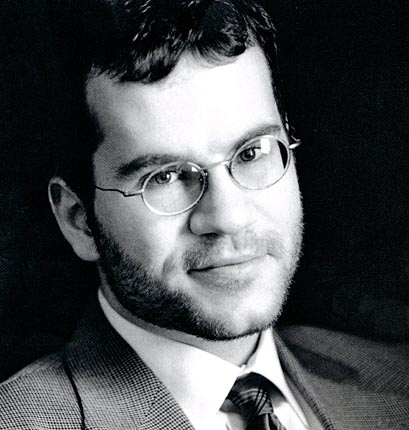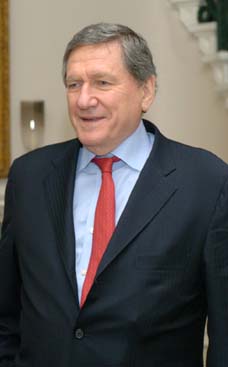
It is not unheard of for a novelist of exceptional talent to write a deliberately difficult book. This urge does not necessarily result in novels with nameless characters, mutating typography or unpunctuated attempts to explore the aphotic realm of human consciousness. It is also not an urge unique to modernism or experimentalism. Some novelists just seem to say, What the hell. John Updike's odd (and wonderful) early novel ''The Centaur'' seems to have been written from this impulse, as do Philip Roth's equally bizarre novel ''The Breast,'' Norman Mailer's ''Why Are We in Vietnam?'' and Kazuo Ishiguro's ''Unconsoled.'' Among this crowd, the young British novelist David Mitchell stands out. Deliberately difficult novels are the only novels he seems to be interested in writing. Author Tom Bissell served as a Peace Corps Volunteer in Uzbekistan.
Tom Bissell writes: What David Mitchell is doing in "Cloud Atlas" is basically James Michener's ''Alaska'' with an I.Q. transplant
History Is a Nightmare
By Tom Bissell
Published: Sunday, August 29, 2004
CLOUD ATLAS
By David Mitchell.
509 pp. Random House. Paper, $14.95.
IT is not unheard of for a novelist of exceptional talent to write a deliberately difficult book. This urge does not necessarily result in novels with nameless characters, mutating typography or unpunctuated attempts to explore the aphotic realm of human consciousness. It is also not an urge unique to modernism or experimentalism. Some novelists just seem to say, What the hell. John Updike's odd (and wonderful) early novel ''The Centaur'' seems to have been written from this impulse, as do Philip Roth's equally bizarre novel ''The Breast,'' Norman Mailer's ''Why Are We in Vietnam?'' and Kazuo Ishiguro's ''Unconsoled.'' Among this crowd, the young British novelist David Mitchell stands out. Deliberately difficult novels are the only novels he seems to be interested in writing.
This is to the good; the tree of literature drops its best fruit after being shaken with conviction and intelligence. Mitchell is neither abstrusely arch nor a wizard of scenic dislocation. One does not sense that -- unlike, say, William Gaddis, Carole Maso or Walter Abish -- Mitchell is trying to chop down the tree of literature in order to replace it with something treelike. On the contrary, his prose is straightforward and, quite often, magnificent. Mitchell is as good at aphorism (''Faith, the least exclusive club on earth, has the craftiest doorman'') as he is at description (''Now and then goldfish splish and gleam like new pennies dropped in water''). The difficulty comes in how Mitchell chooses to construct his novels -- or rather, how he does not choose to construct his novels.
''Ghostwritten,'' his first, involves nine characters (a musician, a terrorist, a host-seeking poltergeist and so on) and nine different locales that have no formal connection to one another. The book's meaning is the readerly equivalent of an inkblot test. ''Number9Dream,'' his second, largely follows a single character through Tokyo and beyond, but the story fractures along so many stress lines of the possible and impossible -- confusion the book does almost nothing to repair -- that the novel becomes little more than a beautifully expressed fantasia. With ''Cloud Atlas,'' Mitchell has returned to the rather nutty method of ''Ghostwritten'': the novel gives us six separate stories, spanning the planet, that cover roughly 1,000 years of time. On one hand, Mitchell's strategy is boldly antithetical to what most narrative-driven novels have been up to since Cervantes. On the other hand, what Mitchell is doing is basically James Michener's ''Alaska'' with an I.Q. transplant.
''Cloud Atlas'' has already been published in England. The reviews have been messiah-worthy. (One critic wrote that the novel makes ''almost everything in contemporary fiction look like a squalid straggle of Nissen huts.'') In The Observer of London, Robert McCrum called ''Cloud Atlas'' ''a remarkable new novel by a significant talent,'' and made its Booker Prize nomination (''Number9Dream'' was a finalist) sound inevitable -- although The Sunday Telegraph caused a brief stir when it disclosed it would not review ''Cloud Atlas'' because its critic found the novel ''unreadable.''
''Cloud Atlas'' imposes a dizzying series of milieus, characters and conflicts upon us: a ship sailing amid some islands around New Zealand during the mid-19th century, wherein an American notary named Adam Ewing befriends, at risk to himself, a stowaway Moriori named Autua; a Belgian estate called Zedelghem in the 1930's, wherein a sexually indecisive aspiring composer named Robert Frobisher serves as amanuensis to an older, more accomplished composer; California during the 1970's, wherein a plucky journalist named Luisa Rey attempts to disclose an ''Erin Brockovich''-style industrial conspiracy; London during the here and now, wherein a 60-ish book editor named Tim Cavendish finds himself accidentally imprisoned in a home for the elderly; Korea in the (just) foreseeable future, wherein a genetically engineered ''fabricant'' named Sonmi-451 is interrogated for her crime of wanting to be fully human; and Hawaii in some distant and thoroughly annihilated future, wherein a young goatherd named Zachry bears unknowing witness to the final fall of humanity into superstition and violence and war.
With the exception of Zachry's tale, the book's thematic centerpiece, we visit each of these stories twice, in the following order: 1, 2, 3, 4, 5, 6, 5, 4, 3, 2, 1. Each story is written quite differently -- so much so that ''Cloud Atlas'' feels like a doggedly expert gloss on various writers and modes. The archaic Ewing section, rendered in journal form, becomes Defoe, possibly Melville. The epistolary Frobisher story is, perhaps, Isherwood or some other sturdy English master. The Luisa Rey section, written in breathlessly lousy prose, is some species of sub-Grisham. The urban comedy of Tim Cavendish's antics is well within Martin Amis's city limits. The plight of Sonmi-451 is Huxley (or ''Blade Runner''). And the daymare of Zachry's postapocalyptic world is something out of William S. Burroughs in a ''Cities of the Red Night'' mood. Taken as a whole, ''Cloud Atlas'' seeks to give the novel a steely new rigging of the possible. It is an impressive achievement. Unfortunately, impressive is usually all that it is.
It is a devious writer indeed who writes in such a way that the critic who finds himself unresponsive to the writer's vision feels like a philistine. So let it be said that Mitchell is, clearly, a genius. He writes as though at the helm of some perpetual dream machine, can evidently do anything, and his ambition is written in magma across this novel's every page. But ''Cloud Atlas'' is the sort of book that makes ambition seem slightly suspect.
The novel is frustrating not because it is too smart but because it is not nearly as smart as its author. Running across its muscularly told tales are two obvious connectors. The first is that every story is in some way ''read'' by a character in another (Ewing's journal is found by Frobisher, Frobisher's letters are read by Rey, Rey's story is submitted to the editor Cavendish, Cavendish's story becomes an old film watched by Sonmi-451, one of the gods worshiped in Zachry's world is Sonmi-451 herself). The second is the strongly implied notion that every central character is a reincarnation of a previous character, a philosophical conceit that in its basic elegance could have flapped from the pages of ''Jonathan Livingston Seagull.'' Cavendish himself addresses this as he mulls over the novel about Luisa Rey that was submitted to him: ''One or two things will have to go: the insinuation that Luisa Rey is this Robert Frobisher chap reincarnated, for example. Far too hippy-druggy -- new age.'' Self-mockery as self-protection is a very old gambit, certainly, but it is beneath a writer as brilliant as Mitchell.
To write a novel that resembles no other is a task that few writers ever feel prepared to essay. David Mitchell has written such a novel -- or almost has. It its need to render every kind of human experience, ''Cloud Atlas'' finds itself staring into the reflective waters of Joyce's ''Ulysses.'' Just as Joyce, in the scene that takes place in the cabman's shelter, found the hidden beauty of cliché-filled prose, so Mitchell does with his Luisa Rey story. Just as Joyce, in the late scene in which Bloom and Dedalus finally sit down together, explored the possibilities of a narrative driven by interrogation, so Mitchell does with his ruthlessly grilled ''fabricant,'' Sonmi-451. ''Cloud Atlas'' is friendlier than ''Ulysses'' but far less fallibly human. If Mitchell's virtuosity too often seems android, one suspects this says less about his achievement and more about the literature of formal innovation. This is a book that might very well move things forward. It is also a book that makes one wonder to what end things are being moved.











